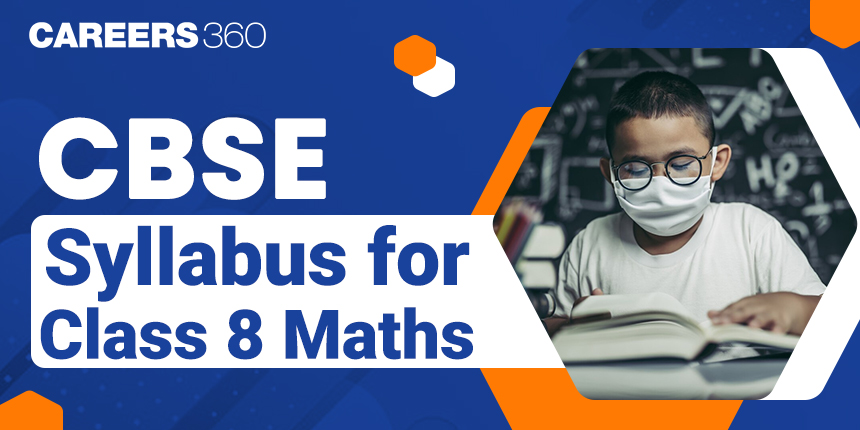Aakash Repeater Courses
Take Aakash iACST and get instant scholarship on coaching programs.
CBSE Syllabus for Class 8 Mathematics 2024-25 - CBSE has released the latest Class 8 maths syllabus online. Most CBSE schools refer to NCERT books are published and designed for Class 8 students. The CBSE Class 8 Maths syllabus emphasises conceptual clarity and a deep understanding of fundamental concepts. The syllabus for Class 8 Maths is available online at ncert.nic.in. We are providing the NCERT Class 8 Maths syllabus as the CBSE Maths syllabus in this article. The CBSE Class 8 Maths syllabus for 2025 includes all chapters and topics found in the NCERT books.
CBSE Class 10 PYQ's: Hindi | English | Science | Math-Basic | Math- Standard
Don't Miss: Best Courses after 10th | Competitive Exams after 10th

Thoroughly knowing the Class 8 Maths CBSE syllabus for 2025 will help in making a proper strategy for exam preparation. The 8th Class Maths CBSE syllabus comprises various topics, subtopics, concepts, and exercises. This is the standard syllabus followed by all CBSE-affiliated schools. Students can download the CBSE Class 8 Maths syllabus PDF to learn about the marking scheme. Read the entire article to know more about the CBSE syllabus for Class 8 Maths.
Below we have provided a table containing the Maths syllabus for class 8 CBSE NCERT for major topics.
Chapter Name | Topics |
| |
| |
| |
Data Handling |
|
Squares and Square Roots |
|
Cubes and Cube Roots |
|
Comparing Quantities |
|
Algebraic Expressions and Identities |
|
Mensuration |
|
Exponents and Powers |
|
Direct and Inverse Proportions |
|
Factorisation |
|
Introduction to Graphs |
|
To score well in the examination, students should practice from the books prescribed by the CBSE for Maths. They have a complete CBSE Class 8th Maths Syllabus, and every topic is explained in an easy way. Students should complete these books first and then start solving samples and previous year's papers.
The very first step to prepare for the exam is to get familiar with the syllabus of class 8 Maths CBSE.
After knowing the class 8 Class Maths CBSE syllabus, make a proper study timetable.
Practice a number of questions from different sources like sample papers, previous year papers, and reference books.
Clear all your doubts, concepts, and seek advice from teachers regarding preparation and syllabus of class 8 Maths CBSE.
Take Aakash iACST and get instant scholarship on coaching programs.
Chapter -1 | NCERT solutions for class 8 Maths chapter 1 Rational Numbers |
Chapter - 2 | NCERT solutions for class 8 Maths chapter 2 Linear Equations in One Variable |
Chapter- 3 | NCERT solutions for class 8 Maths chapter 3 Understanding Quadrilaterals |
Chapter- 4 | NCERT solutions for class 8 Maths chapter 5 Data Handling |
Chapter- 5 | NCERT solutions for class 8 Maths chapter 6 Squares and Square Roots |
Chapter- 6 | NCERT solutions for class 8 Maths chapter 7 Cubes and Cube Roots |
Chapter- 7 | NCERT solutions for class 8 Maths chapter 8 Comparing Quantities |
Chapter- 8 | NCERT solutions for class 8 Maths chapter 9 Algebraic Expressions and Identities |
Chapter- 9 | |
Chapter- 10 | NCERT Solutions for class 8 Maths chapter 12 Exponents and Powers |
Chapter- 11 | NCERT solutions for class 8 Maths chapter 13 Direct and Inverse Proportions |
Chapter- 12 | |
Chapter- 13 | NCERT solutions for class 8 Maths chapter 15 Introduction to Graphs |
No, the concepts of the question remain the same, but sometimes students may find some questions coming directly from CBSE books.
Go through the complete CBSE syllabus for class 8 Maths, then make a proper time table and follow it. Regular practice of a variety of questions can help in scoring well in class 8 exams.
Yes, CBSE books are the prime source for the preparation of the exam.
Yes, there are around 20 questions asked from the Maths in the NMMS exam.
Exam Date:22 July,2025 - 29 July,2025
Exam Date:22 July,2025 - 28 July,2025
Hello
Since you are a domicile of Karnataka and have studied under the Karnataka State Board for 11th and 12th , you are eligible for Karnataka State Quota for admission to various colleges in the state.
1. KCET (Karnataka Common Entrance Test): You must appear for the KCET exam, which is required for admission to undergraduate professional courses like engineering, medical, and other streams. Your exam score and rank will determine your eligibility for counseling.
2. Minority Income under 5 Lakh : If you are from a minority community and your family's income is below 5 lakh, you may be eligible for fee concessions or other benefits depending on the specific institution. Some colleges offer reservations or other advantages for students in this category.
3. Counseling and Seat Allocation:
After the KCET exam, you will need to participate in online counseling.
You need to select your preferred colleges and courses.
Seat allocation will be based on your rank , the availability of seats in your chosen colleges and your preferences.
4. Required Documents :
Domicile Certificate (proof that you are a resident of Karnataka).
Income Certificate (for minority category benefits).
Marksheets (11th and 12th from the Karnataka State Board).
KCET Admit Card and Scorecard.
This process will allow you to secure a seat based on your KCET performance and your category .
check link for more details
https://medicine.careers360.com/neet-college-predictor
Hope this helps you .
Hello Aspirant, Hope your doing great, your question was incomplete and regarding what exam your asking.
Yes, scoring above 80% in ICSE Class 10 exams typically meets the requirements to get into the Commerce stream in Class 11th under the CBSE board . Admission criteria can vary between schools, so it is advisable to check the specific requirements of the intended CBSE school. Generally, a good academic record with a score above 80% in ICSE 10th result is considered strong for such transitions.
hello Zaid,
Yes, you can apply for 12th grade as a private candidate .You will need to follow the registration process and fulfill the eligibility criteria set by CBSE for private candidates.If you haven't given the 11th grade exam ,you would be able to appear for the 12th exam directly without having passed 11th grade. you will need to give certain tests in the school you are getting addmission to prove your eligibilty.
best of luck!
According to cbse norms candidates who have completed class 10th, class 11th, have a gap year or have failed class 12th can appear for admission in 12th class.for admission in cbse board you need to clear your 11th class first and you must have studied from CBSE board or any other recognized and equivalent board/school.
You are not eligible for cbse board but you can still do 12th from nios which allow candidates to take admission in 12th class as a private student without completing 11th.

Take Aakash iACST and get instant scholarship on coaching programs.

This ebook serves as a valuable study guide for NEET 2025 exam.

This e-book offers NEET PYQ and serves as an indispensable NEET study material.

As per latest syllabus. Physics formulas, equations, & laws of class 11 & 12th chapters
As per latest syllabus. Chemistry formulas, equations, & laws of class 11 & 12th chapters
As per latest 2024 syllabus. Study 40% syllabus and score upto 100% marks in JEE